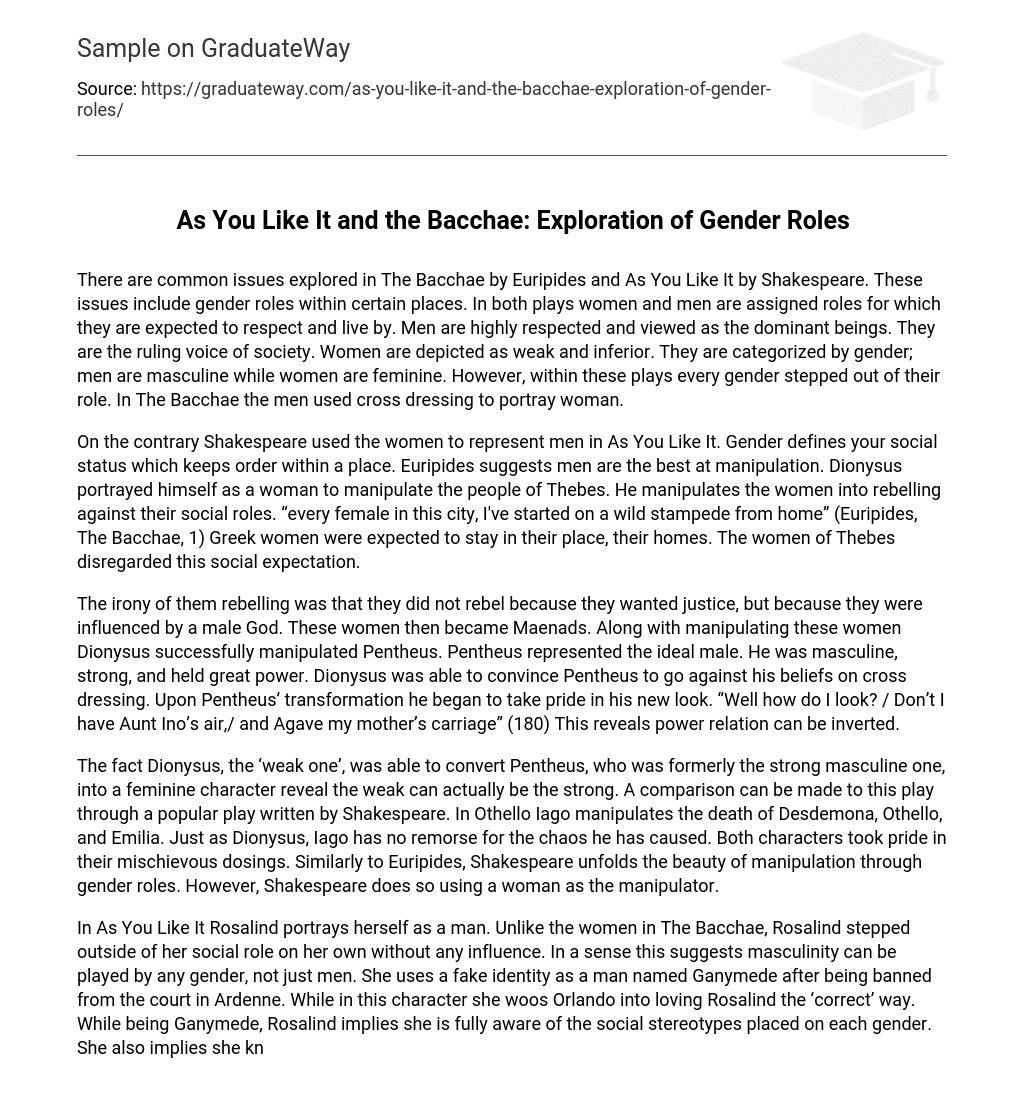Both The Bacchae by Euripides and As You Like It by Shakespeare explore common issues, including gender roles in certain places. In both plays, men and women are assigned roles that they are expected to adhere to and respect. Men are highly regarded and perceived as the dominant figures, holding power in society. On the other hand, women are portrayed as weak and inferior, categorized solely by their gender as feminine beings. Nevertheless, in these plays, there is a breaking of societal norms, where every gender steps out of their expected roles. In The Bacchae, men utilize cross dressing as a means to depict women.
In contrast, Shakespeare employed women as representatives of men in As You Like It. Gender plays a crucial role in defining one’s social status and maintaining order within a society. Euripides, on the other hand, suggests that men excel in the art of manipulation. In The Bacchae, Dionysus adopts a female disguise to manipulate the people of Thebes, particularly the women, encouraging them to rebel against their assigned social roles. Euripides writes, “every female in this city, I’ve started on a wild stampede from home” (The Bacchae, 1). Greek society expected women to confine themselves to their homes, yet the women of Thebes defied this social expectation.
The women rebelled not out of a desire for justice, but because they were influenced by a male God, which is ironic. Consequently, these women became Maenads. Dionysus successfully manipulated both these women and Pentheus. Pentheus, who symbolized the ideal male as he possessed attributes of masculinity, strength, and great power, was convinced by Dionysus to go against his beliefs on cross-dressing. After his transformation, Pentheus began to take pride in his new appearance, asking, “Well how do I look? / Don’t I have Aunt Ino’s air,/ and Agave my mother’s carriage” (180). This illustrates the potential for power dynamics to be reversed.
The fact that Dionysus, who was considered weak, was able to transform Pentheus, who was previously strong and masculine, into a feminine character, reveals that the weak can actually be strong. This similarity can be seen in a popular play by Shakespeare. In Othello, Iago manipulates the deaths of Desdemona, Othello, and Emilia. Like Dionysus, Iago shows no remorse for the chaos he has caused and takes pride in his mischievous actions. Both Euripides and Shakespeare highlight the power of manipulation through gender roles. However, Shakespeare introduces a female character as the manipulator.
In As You Like It, Rosalind takes on the role of a man, portraying herself as Ganymede. Unlike the women in The Bacchae, who were influenced to step outside their social roles, Rosalind chooses to do so on her own. This suggests that anyone, regardless of gender, can embody masculinity. After being banished from the court in Ardenne, she assumes the identity of Ganymede and uses it to woo Orlando, teaching him how to love Rosalind in the ‘correct’ manner. Through her disguise, Rosalind displays her knowledge and understanding of the societal stereotypes that are placed on each gender. Furthermore, she implies that she is familiar with the societal expectations that come with being a man or a woman.
She states that she will conceal her “woman fears” while assuming the role of Ganymede. Society expects men to be strong and devoid of fear, while women are expected to be fearful due to their inherent nature. Up until now, Rosalind has indirectly conformed to the stereotypes imposed on women. Despite taking place in different locations, both plays share a common setting. The forest in Thebes represents distress, while the forest in Ardenne symbolizes romance. In Thebes, the transformed women, now as hunters under Dionysus’ control, attacked and killed the cross-dressing Pentheus.
The significance of the situation lies in the dominance of women, exemplified by the women’s control over Pentheus, who once ruled Thebes but gave up his masculinity to wear a wig and a skirt. The forest of Ardenne serves as a symbol of romance. Rosalind’s manipulation enables a three-way wedding to take place. While both plays explore gender themes, they approach it differently. The Baachae depicts cross dressing as inappropriate and unacceptable, as indicated by the lowering of social status when wearing a skirt instead of pants. In contrast, As You Like It embraces cross dressing.
Orlando, who is in love with Rosalind, loves both the woman and the male persona Ganymede that Rosalind portrays. Society has specific roles for each gender, with women assigned to be feminine and inferior, and men assigned to be superior and masculine. The act of cross-dressing allows individuals to challenge these gender roles, which can lead to conflict within society’s hierarchical structure. In the play The Bacchae, Euripides employs men to represent women, while in As You Like It, Shakespeare uses women to represent men. Euripides presents women as weak, while Shakespeare does not assign any value based on gender.





